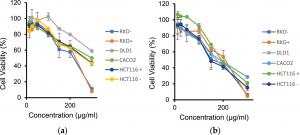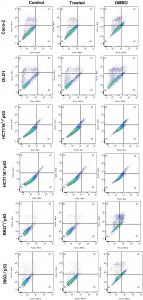
Aromatic plant can fight colorectal cancer, say scientists
Scientists endow a naturally growing plant with therapeutic properties that can effectively fight colorectal cancer.
SHARJAH, EMIRATE OF SHARJAH, UNITED ARAB EMIRATES, January 27, 2025 /EINPresswire.com/ -- Scientists from the University of Sharjah have found that a naturally growing aromatic plant contains ingredients with the ability to treat colorectal cancer.
The plant is a common herb. It is scientifically known as Artemisia herba-alba. It grows naturally in North Africa and the Middle East where the inhabitants have traditionally been using it as medicine to treat bronchitis, diarrheas, hypertension and diabetes.
Artemisia herba-alba is popularly known by different appellations like common wormwood, white wormwood, or simply herba alba.
The news that it can be an effective weapon to fight colorectal cancer is reported in a study published in the peer-reviewed journal Food Science and Nutrition. (Original source URL: https://onlinelibrary.wiley.com/doi/full/10.1002/fsn3.4715)
“These results suggest that Artemisia herba-alba has great potential as a new tool in fighting CRC (colorectal cancer),” says Dr. Lara Bou Malhab. “Artemisia herba-alba could be a promising natural ingredient for new cancer treatments based on (our study’s) findings.”
Dr. Bou Malhab, the study’s lead author, is a research associate at Sharjah University’s Research Institute for Medical and Health Sciences. The plant material for the study included aerial parts of Artemisia herba-alba that were collected from southern Jordan in May 2021.
“[Co-author) Prof. M. Hudaib, an esteemed expert in Pharmacognosy and Phytochemistry at the University of Jordan's School of Pharmacy, conducted the botanical identification of these specimens,” the authors write. “After collection, the aerial parts were air-dried at room temperature, and protected from direct sunlight to avoid deterioration of sensitive components.”
Once dried, the plant material was mechanically ground into fine powder “with particles no larger than 0.5 mm. This preliminary step was done to enhance the effectiveness of the next extraction process, guaranteeing the highest possible amount of the extracted phytochemicals.”
The study finds that the extract contained many active compounds with properties capable of fighting colorectal cancer with various degrees of effectiveness. The findings show that the extract from Artemisia herba-alba stopped the growth of cancerous cells and caused them to die, regardless of specific genetic traits.
“It also disrupted the cell cycle and reduced the activity of proteins like Cyclin B1 and CDK1, which are crucial for cancer cell division. Additionally, it blocked the PI3K/AKT/mTOR pathway, which plays a major role in cancer development,” adds Dr. Bou Malhab.
“The current study underscores the extract's selective cytotoxicity against CRC cell lines, highlighting its potential to serve as a complementary treatment to existing cancer treatment with more efficacious and less harmful alternatives.
“Our findings highlight the immense potential of Artemisia herba-alba as a natural source for developing innovative therapies against colorectal cancer, addressing the urgent need for treatments with fewer side effects and greater efficacy.”
Colorectal cancer or CRC is the third most common cancer worldwide. It accounts for nearly 10% of all cancer cases. It is the second leading cause of cancer-related deaths. In 2020, it caused 1 million deaths with two million new cases reported in the same year. According to World Health Organization, CRC predominantly affects old individuals with most cases occurring in people aged 50 and above.
"Colorectal cancer (CRC) is a common and serious illness, making it essential to find new and better treatments,” emphasizes Dr. Bou Malhab.
The study could assume considerable significance if noted and adopted by big pharma as current traditional chemotherapy, used to treat colorectal cancer, faces challenges with cancerous cells becoming resistant to the drugs besides their harmful side effect.
“Which is why alternative solutions are needed. One plant, Artemisia herba-alba, known for its medicinal applications, was studied for its ability to fight CRC,” maintains Dr. Bou Malhab.” Researchers tested a methanol-based extract of this plant on eight different types of CRC cells, aiming to see how it affected cell survival, growth, and death, as well as its impact on a key cancer-related pathway.”
The study’s findings emphasize Artemisia herba-alba’s “potential as an anticancer agent for CRC. [They] demonstrate its cytotoxic effects, ability to induce apoptosis, ability to arrest the cell cycle …, suggesting a wider therapeutic significance.”
As they conclude their study by recounting their findings, the scientists urge further research “to elucidate the molecular mechanisms and clinical efficacy of Artemisia herba-alba in the context of cancer treatment.”
LEON BARKHO
University Of Sharjah
+971 501654376
email us here
Distribution channels: Chemical Industry, Food & Beverage Industry, Healthcare & Pharmaceuticals Industry, Technology, World & Regional
Legal Disclaimer:
EIN Presswire provides this news content "as is" without warranty of any kind. We do not accept any responsibility or liability for the accuracy, content, images, videos, licenses, completeness, legality, or reliability of the information contained in this article. If you have any complaints or copyright issues related to this article, kindly contact the author above.
Submit your press release

